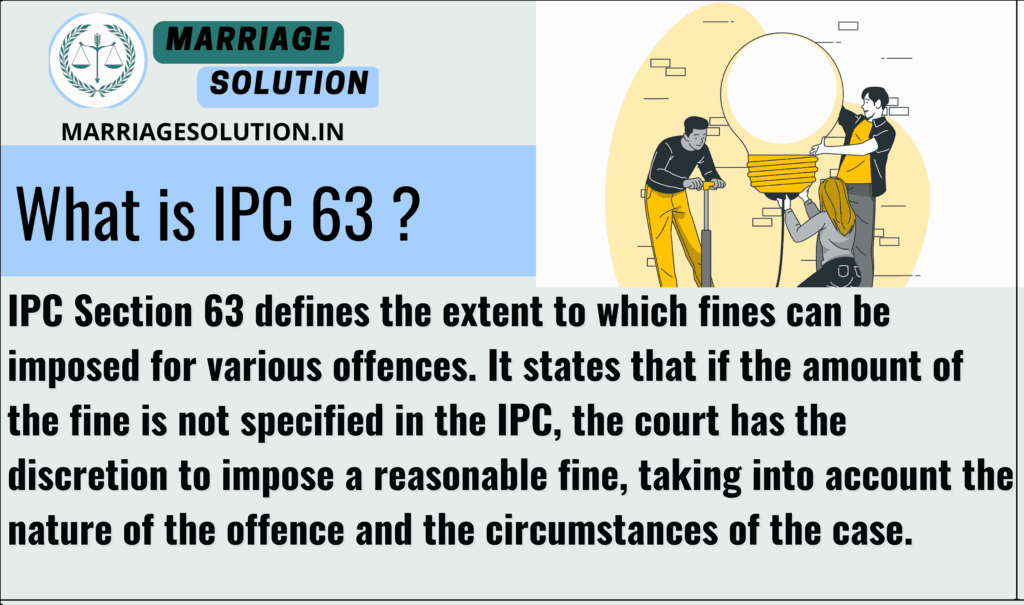Introduction of IPC 63
IPC Section 63 is an important provision in the Indian Penal Code, 1860. This section deals with the concept of fines as a form of punishment. It provides guidelines on how fines should be determined and enforced when someone is convicted of an offence under the IPC. Understanding IPC Section 63 is crucial for grasping the legal framework of fines in India.
What is IPC Section 63 ?
IPC Section 63 defines the extent to which fines can be imposed for various offences. It states that if the amount of the fine is not specified in the IPC, the court has the discretion to impose a reasonable fine, taking into account the nature of the offence and the circumstances of the case.

IPC Section 63 Overview
IPC Section 63 explains how much money the court can ask someone to pay as punishment for crimes. It says that if the laws do not specify the amount of money for the punishment, the court can decide a reasonable amount based on the crime and the situation.
Key-points IPC Section 63
What is a Fine? A fine is money that someone has to pay as punishment for committing a crime. Under IPC Section 63, fines are used as a way to punish people for their crimes.
Court’s Decision: One of the main points of IPC Section 63 is that the court has the power to decide how much money the fine should be. The court can make sure the fine is appropriate for the crime and the person’s situation.
Factors for Deciding Fine: When deciding the amount of the fine, the court considers various things, such as how serious the crime was, how much money the person has, and any other important details about the case.
No Specified Fine: If the laws do not specify a fixed amount of money as the fine for a particular crime, IPC Section 63 allows the court to decide a reasonable amount. This ensures that people are punished properly, even if there are no specific guidelines.
Purpose of Fine: Fines serve several purposes, such as deterring people from committing crimes, punishing them for their actions, and making them pay for the harm they caused. Fines are a way for the government to punish people without sending them to jail.
Legal Examples: There are many legal cases where courts have used IPC Section 63 to impose fines on people. These cases show how this section is applied in practice and how the court has the power to decide on monetary punishments.
IPC 63 Punishment
Punishment: Imposition of a fine.
Fine: Determined by the court, based on the offence and circumstances.
63 IPC bailable or not ?
The section itself does not define bailability; it depends on the primary offence for which the fine is imposed.
Section 63 IPC in short information
| Offence | Definition | Punishment | Bailable or Not |
|---|---|---|---|
| Imposition of Fine | Monetary penalty for an offence | Fine amount determined by the court | Depends on the primary offence |
IPC 63 FAQs
What does IPC Section 63 cover?
It deals with the imposition of fines as punishment for offences under the IPC.
How is the amount of the fine determined?
The court has the discretion to decide the fine, considering the nature of the offence and the offender’s circumstances.
What happens if the IPC does not specify a fine for an offence?
The court can impose a reasonable fine at its discretion.
Why are fines imposed?
Fines act as a deterrent, provide punishment, and can offer reparation for the offence committed.
If you need support with court proceedings or any other legal matters, don’t hesitate to reach out for assistance.
Court or any other marriage-related issues, our https://marriagesolution.in/lawyer-help-1/ website may prove helpful. By completing our enquiry form and submitting it online, we can provide customized guidance to navigate through the process effectively. Don’t hesitate to contact us for personalized solutions; we are here to assist you whenever necessary!
